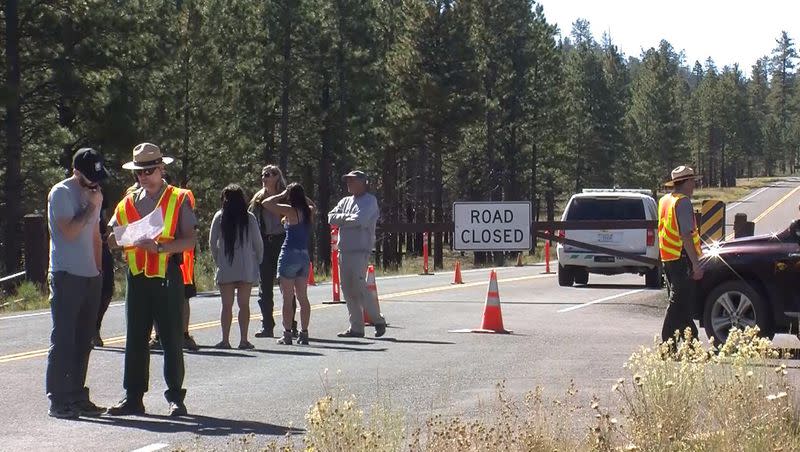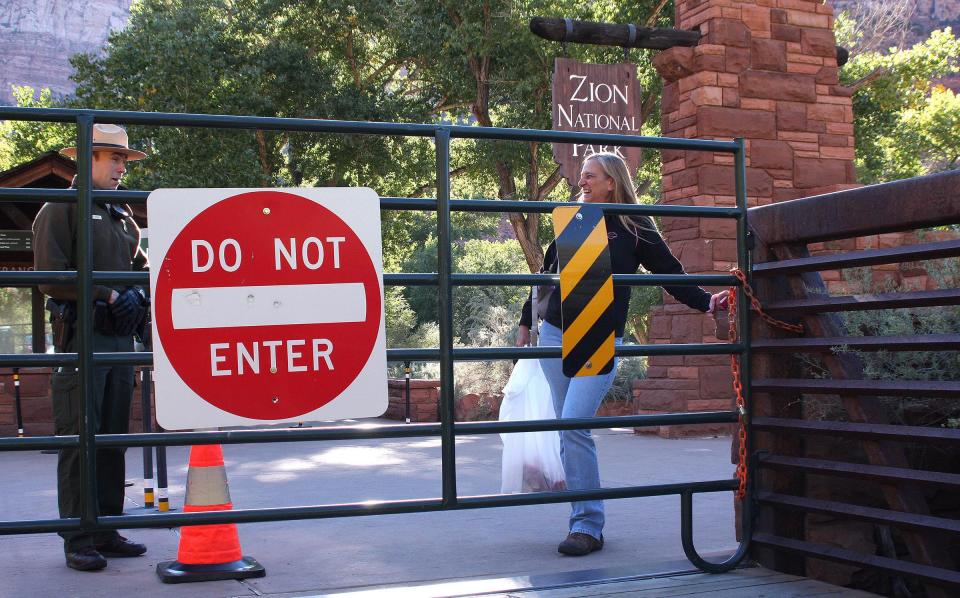Cox: Utah’s got a plan to keep national parks open amid looming federal government shutdown

- Oops!Something went wrong.Please try again later.
- Oops!Something went wrong.Please try again later.
- Oops!Something went wrong.Please try again later.
With a shutdown of the federal government appearing increasingly likely, Utah Gov. Spencer Cox says the state has a plan to help keep the state’s national parks open.
Cox said he has been working with outgoing Utah House Speaker Brad Wilson, R-Kaysville, and Utah Senate President Stuart Adams, R-Layton, “and we are all in agreement that it’s worth keeping the parks open.”
National parks are “the lifeblood” of nearby communities “so we are going to step up and do that again,” he said.
Responding to reporters’ questions during the PBS Utah’s monthly governor’s press conference on Thursday, Cox said he believes the plan can be accomplished “with existing funds without having to call a special session. So that’s the track that we are taking right now,” he said.
Cox said “hope is dissipating quickly” in averting the shutdown. “As we kind of evaluate the situation, it could be a long one.”
During the government shutdown of 2013, which lasted 16 days, Utah Gov. Gary Herbert negotiated with the Department of Interior and signed agreements to keep national parks open, he said.
“Utah funded that to the tune of about a million dollars and ... we never did get reimbursed for it,” Cox said.
Cox said the current contingency plan covers only the parks. Other federally funded programs such as Head Start and food inspections could be impacted.
“Obviously if this was a situation where were shutdown extended for several months, we would have to reevaluate and potentially call a special session for that but we think we have enough right now that we can do that and then and then we can adjust the budget next year in in January when we come back,” Cox said.
Leaders of the Utah Legislature said earlier this week the national parks need to stay open.
“Some counties are almost over 90% owned by the federal government. You shut down the national parks, it destroys their entire economy,” Adams, the Senate president, told reporters during a Monday news conference in St. George.
“If the Department of the Interior will let us, we’re not going to let that happen. We’ll keep the parks open like we did last time,” Adams said, calling the lack of a balanced federal budget “disappointing.”

Wilson, who’s resigning from the Legislature to run for the U.S. Senate, took a swipe at Washington, D.C. at the same news conference, held during legislative interim meetings.
“Well, big surprise, right? We’re going to have another federal government shutdown,” the speaker said. “Utah has seen this before. We’ll do what we’ve done in the past. We’ll get together and we’ll do what we can, but we do not want our national parks to shut down.”
The shutdown in 2018-2019 was 35 days long, the longest in history.
On Thursday morning, House Republicans blocked a Pentagon funding bill for the second time this week. House Republican leaders sent members home for the week amid deep divisions over funding the government ahead of the Sept. 30 deadline.
Cox said of Congress’ inability to pass a budget, “This is stupid. ... This is the one thing they’re supposed to do, right? Like, pass a budget guys. Like it’s been 10 years more than that since they’ve actually done the budgeting process the way it was envisioned to be,” he said.
Utah, meanwhile, passes a budget every year. “I’m trying to imagine what our state would be like if we acted like this. We have 45 days to pass a budget and we do it every year,” Cox said.
Contributing: Lisa Riley Roche

